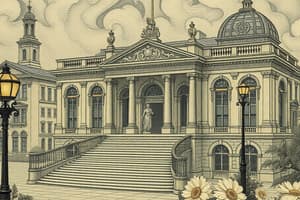Podcast
Questions and Answers
What distinguishes political science from politics?
What distinguishes political science from politics?
- Political science is solely about the government, whereas politics encompasses all social interactions.
- Political science focuses on empirical analysis, while politics involves practical power dynamics. (correct)
- Political science examines historical events, while politics relates only to current affairs.
- Political science ignores moral philosophy, while politics is heavily based on ethics.
What is NOT considered an essential element of the state?
What is NOT considered an essential element of the state?
- Population
- Party System (correct)
- Territory
- Sovereignty
How does political science's development compare to other fields of study according to Buckle?
How does political science's development compare to other fields of study according to Buckle?
- It is the most advanced of all sciences.
- It is equally developed as the other social sciences.
- It is the least developed both as a science and an art. (correct)
- It has outpaced the development of the arts.
Which of the following statements best captures the meaning of 'the state is the beginning and end of politics'?
Which of the following statements best captures the meaning of 'the state is the beginning and end of politics'?
Which term does NOT accurately differentiate between the state, society, community, and government?
Which term does NOT accurately differentiate between the state, society, community, and government?
What are the essential elements that define a state?
What are the essential elements that define a state?
Which of the following best distinguishes a state from a society?
Which of the following best distinguishes a state from a society?
What is a key theory explaining the origins of the state in Indian politics?
What is a key theory explaining the origins of the state in Indian politics?
What are the characteristics of a welfare state?
What are the characteristics of a welfare state?
Which aspect is most important in distinguishing welfare states from other forms of government?
Which aspect is most important in distinguishing welfare states from other forms of government?
What is a key characteristic of a welfare state?
What is a key characteristic of a welfare state?
Which of the following best describes a secular state?
Which of the following best describes a secular state?
Which concept is closely associated with the principles of Liberalism?
Which concept is closely associated with the principles of Liberalism?
In the context of a welfare state, which of the following is NOT typically a feature?
In the context of a welfare state, which of the following is NOT typically a feature?
Which statement reflects a misconception about secularism?
Which statement reflects a misconception about secularism?
Which of the following is a key characteristic of Liberalism?
Which of the following is a key characteristic of Liberalism?
What distinguishes democratic socialism from traditional socialism?
What distinguishes democratic socialism from traditional socialism?
Which statement best describes a key characteristic of modern Liberalism?
Which statement best describes a key characteristic of modern Liberalism?
In socialism, what is a primary approach to economic change?
In socialism, what is a primary approach to economic change?
What is a common misconception about Liberalism?
What is a common misconception about Liberalism?
What is a key feature of democratic socialism?
What is a key feature of democratic socialism?
What are the stages of the development of social democracy?
What are the stages of the development of social democracy?
What describes 'Fabian Socialism'?
What describes 'Fabian Socialism'?
What is 'dialectical materialism' in Marxist theory?
What is 'dialectical materialism' in Marxist theory?
Which of the following is NOT associated with socialism?
Which of the following is NOT associated with socialism?
What is the principle of Dialectical Materialism in Marxism?
What is the principle of Dialectical Materialism in Marxism?
How does Marx's theory of surplus value relate to capitalism?
How does Marx's theory of surplus value relate to capitalism?
What characterizes Fabian Socialism in comparison to traditional socialism?
What characterizes Fabian Socialism in comparison to traditional socialism?
What aspect did Gandhi emphasize in his approach to politics?
What aspect did Gandhi emphasize in his approach to politics?
What is a significant criticism of Marxism regarding its view on the state?
What is a significant criticism of Marxism regarding its view on the state?
What does Marx's theory of surplus value primarily focus on?
What does Marx's theory of surplus value primarily focus on?
Which concept is central to Marx's class struggle theory?
Which concept is central to Marx's class struggle theory?
What does Gandhi's concept of Ram Rajya represent?
What does Gandhi's concept of Ram Rajya represent?
Which aspect differentiates Gandhian philosophy from Marxism?
Which aspect differentiates Gandhian philosophy from Marxism?
What is the primary characteristic of power?
What is the primary characteristic of power?
Which of the following best describes nominal sovereignty?
Which of the following best describes nominal sovereignty?
What is a key characteristic of the concept of sovereignty?
What is a key characteristic of the concept of sovereignty?
How does authority differ from power?
How does authority differ from power?
What is one common source of power?
What is one common source of power?
What distinguishes popular sovereignty from political sovereignty?
What distinguishes popular sovereignty from political sovereignty?
What is the primary difference between power and authority?
What is the primary difference between power and authority?
Which of the following best describes a source of power?
Which of the following best describes a source of power?
Which characteristic is NOT typically associated with authority?
Which characteristic is NOT typically associated with authority?
In the context of liberty, which statement is accurate?
In the context of liberty, which statement is accurate?
Which of the following freedoms is NOT typically enjoyed in democratic states?
Which of the following freedoms is NOT typically enjoyed in democratic states?
What is one key characteristic of authority?
What is one key characteristic of authority?
Which of the following is a source of authority?
Which of the following is a source of authority?
What is a condition necessary to protect liberty?
What is a condition necessary to protect liberty?
Which of the following freedoms is typically granted to citizens in democratic states?
Which of the following freedoms is typically granted to citizens in democratic states?
What is a key distinction between freedom and equality?
What is a key distinction between freedom and equality?
Flashcards
Political Science Definition (Traditional)
Political Science Definition (Traditional)
The study of the state, its structure, and functions, differentiating it from politics (practice) and political philosophy (theory).
Political Science as an Art, not Science
Political Science as an Art, not Science
Buckle's assertion suggests political science isn't as advanced as other disciplines.
State as Starting/Ending Point of Politics
State as Starting/Ending Point of Politics
The state is the fundamental context and ultimate goal of political activity.
State
State
Signup and view all the flashcards
State vs. Society/Community/Government
State vs. Society/Community/Government
Signup and view all the flashcards
State definition
State definition
Signup and view all the flashcards
State vs. Society
State vs. Society
Signup and view all the flashcards
Welfare state definition
Welfare state definition
Signup and view all the flashcards
State origin theories
State origin theories
Signup and view all the flashcards
Social contract theory
Social contract theory
Signup and view all the flashcards
Welfare state characteristics
Welfare state characteristics
Signup and view all the flashcards
Welfare State Definition
Welfare State Definition
Signup and view all the flashcards
Welfare State Characteristics
Welfare State Characteristics
Signup and view all the flashcards
Secular State Definition
Secular State Definition
Signup and view all the flashcards
Liberal principles
Liberal principles
Signup and view all the flashcards
State Origin in Indian Politics
State Origin in Indian Politics
Signup and view all the flashcards
Social Contract Theory
Social Contract Theory
Signup and view all the flashcards
Key elements of Liberalism
Key elements of Liberalism
Signup and view all the flashcards
Modern Liberalism characteristics
Modern Liberalism characteristics
Signup and view all the flashcards
Democratic Socialism explanation
Democratic Socialism explanation
Signup and view all the flashcards
Social Democracy stages
Social Democracy stages
Signup and view all the flashcards
Liberalism
Liberalism
Signup and view all the flashcards
Key features of democratic socialism
Key features of democratic socialism
Signup and view all the flashcards
Stages of social democracy
Stages of social democracy
Signup and view all the flashcards
Fabian Socialism
Fabian Socialism
Signup and view all the flashcards
Dialectical Materialism
Dialectical Materialism
Signup and view all the flashcards
Dialectical Materialism (Marxism)
Dialectical Materialism (Marxism)
Signup and view all the flashcards
Marx's Economic Interpretation of History
Marx's Economic Interpretation of History
Signup and view all the flashcards
Marx's Surplus Value
Marx's Surplus Value
Signup and view all the flashcards
Marx's Class Struggle
Marx's Class Struggle
Signup and view all the flashcards
Marx's Theory of the State
Marx's Theory of the State
Signup and view all the flashcards
Fabian Socialism
Fabian Socialism
Signup and view all the flashcards
Gandhi's Spiritualization of Politics
Gandhi's Spiritualization of Politics
Signup and view all the flashcards
Gandhi's Non-violent Ideal State
Gandhi's Non-violent Ideal State
Signup and view all the flashcards
Marx's Surplus Value
Marx's Surplus Value
Signup and view all the flashcards
Marx's Class Struggle
Marx's Class Struggle
Signup and view all the flashcards
Marx's State Theory
Marx's State Theory
Signup and view all the flashcards
Gandhi's Spiritual Politics
Gandhi's Spiritual Politics
Signup and view all the flashcards
Gandhi's Ram Rajya
Gandhi's Ram Rajya
Signup and view all the flashcards
Gandhi as Social Reformer
Gandhi as Social Reformer
Signup and view all the flashcards
Gandhi-Marx Comparison
Gandhi-Marx Comparison
Signup and view all the flashcards
Power definition
Power definition
Signup and view all the flashcards
Sources of power
Sources of power
Signup and view all the flashcards
Authority definition
Authority definition
Signup and view all the flashcards
Sources of authority
Sources of authority
Signup and view all the flashcards
Power & Authority
Power & Authority
Signup and view all the flashcards
Liberty definition
Liberty definition
Signup and view all the flashcards
Sovereignty definition
Sovereignty definition
Signup and view all the flashcards
Freedoms in democratic states
Freedoms in democratic states
Signup and view all the flashcards
Power (शक्ति)
Power (शक्ति)
Signup and view all the flashcards
Authority (सत्ता)
Authority (सत्ता)
Signup and view all the flashcards
Nominal Sovereignty
Nominal Sovereignty
Signup and view all the flashcards
Actual Sovereignty
Actual Sovereignty
Signup and view all the flashcards
Legal Sovereignty
Legal Sovereignty
Signup and view all the flashcards
Political Sovereignty
Political Sovereignty
Signup and view all the flashcards
Popular Sovereignty
Popular Sovereignty
Signup and view all the flashcards
Difference between Power and Authority
Difference between Power and Authority
Signup and view all the flashcards
Forms of power
Forms of power
Signup and view all the flashcards
Sources of power
Sources of power
Signup and view all the flashcards
Authority Definition
Authority Definition
Signup and view all the flashcards
Sources of Authority
Sources of Authority
Signup and view all the flashcards
Liberty Definition
Liberty Definition
Signup and view all the flashcards
Liberty & Sovereignty, Law, Freedom
Liberty & Sovereignty, Law, Freedom
Signup and view all the flashcards
Citizen Freedoms
Citizen Freedoms
Signup and view all the flashcards
Conditions for Protecting Liberty
Conditions for Protecting Liberty
Signup and view all the flashcards
Equality Definition
Equality Definition
Signup and view all the flashcards
Equality & Freedom Relationship
Equality & Freedom Relationship
Signup and view all the flashcards




